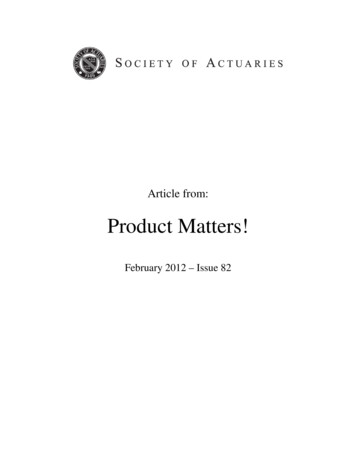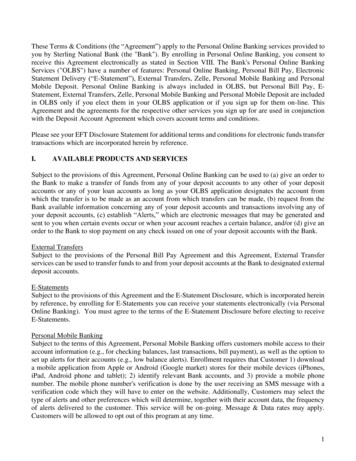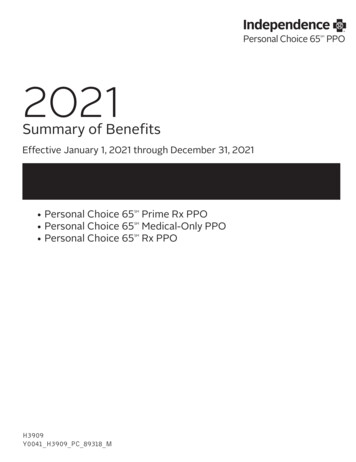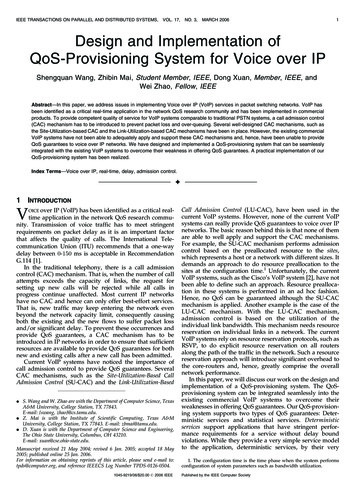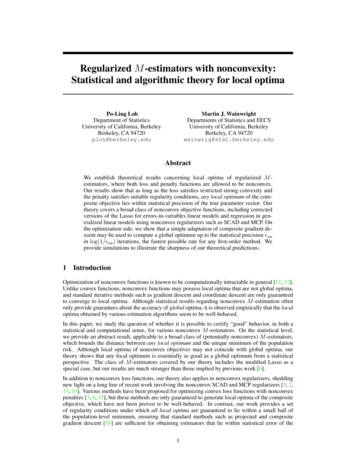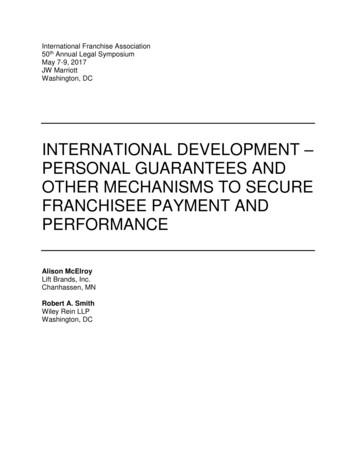
Transcription
International Franchise Association50th Annual Legal SymposiumMay 7-9, 2017JW MarriottWashington, DCINTERNATIONAL DEVELOPMENT –PERSONAL GUARANTEES ANDOTHER MECHANISMS TO SECUREFRANCHISEE PAYMENT ANDPERFORMANCEAlison McElroyLift Brands, Inc.Chanhassen, MNRobert A. SmithWiley Rein LLPWashington, DC
TABLE OF CONTENTSPageI.Introduction . 1II.Guarantees – Background. . 1A.What is a Guarantee? . 1B.Skin in the Game. . 2C.Types of Guarantees. . 2D.Transfer Restrictions. . 3III.Negotiating and Drafting Guarantees. . 3IV.Variations on a Personal Guarantee. 8A.Standby Guarantee. . 8B.Limitation of Waivable Defenses. . 9C.Financial Caps. . 9D.Term Limits. . 10E.Performance Guarantee. 10V.Alternatives to Personal Guarantees. . 10A.Letter of Credit. . 10B.Bank Guarantees. . 11C.Security Interest in Assets. 12D.Cash Deposit/Liquidated Damages. . 12E.Guarantee by a Related Entity. . 13F.US Affiliate Guarantee. . 14G.Capitalization Commitment. . 14H.Trade Credit Insurance. . 15VI.Enforcement of Guarantees in International Franchise Agreements. . 16A.Arbitration. 16B.Enforcing U.S. Court Judgments in Foreign Jurisdictions. . 19VII. Conclusion. 21EXHIBIT A – Long Form GuaranteeEXHIBIT B – Short Form GuaranteeEXHIBIT C – Performance GuaranteeEXHIBIT D – Standby GuaranteeEXHIBIT E – Financial Cap GuaranteeEXHIBIT F – Term Limit GuaranteeEXHIBIT G – Guarantee Effective on Net Worth DecreaseEXHIBIT H – Signatories To The New York Convention
I.Introduction. 1When a franchisee and franchisor begin discussing international development,their interests initially are aligned. The franchisor wants to enter or expand in thesubject country and the franchisee desires to profit from the introduction or expansion ofthe franchisor’s brand in the franchisee’s market. Beyond that, their interests diverge ina number of directions. In addition to the fees to be paid and the required developmentschedule, the franchisor will seek to minimize the risk that the franchisee will not meetits contractual obligations and, as a result, will typically seek to bind all parties related tothe franchisee to ensure that the franchisee does so. On the other hand, the franchiseeentity, which internationally is often a company with substantial assets and experience,will resist this effort to encumber the financial statements of its principals with aguarantee. As a result, some of the most protracted negotiations often will be focusedon whether, and to what extent, persons and entities related to the franchisee will beliable for the franchisee’s failures.This paper will discuss the basics of a guarantee and the importance of local lawconsiderations in drafting and enforcing a guarantee. It also will address variations on aguarantee, as well as alternatives to a guarantee. Finally, the paper will discussenforcement challenges.II.Guarantees – Background.A.What is a Guarantee?According to Black’s Law Dictionary, a guarantee is a “promise to answer for thepayment of some debt, or the performance of some duty, in case of the failure ofanother who is liable in the first instance.”2 A guarantee is similar to a warranty in thatthey both are issued as an obligation of one party to another to indemnify that partyagainst a possible default. While a warranty relates to present or past actions, and is anindependent promise designed to protect another party from loss when what iswarranted is not in the same form as when the contract is entered, a guarantee relatesto a future obligation and is a collateral promise designed to protect one contractingparty (the franchisor) if the other contracting party (the franchisee) fails to meet itsobligations under the contract.3 Guarantees require mutual assent, consideration,definiteness and a meeting of the minds – much like any other contract. A guaranteerequires a primary debt obligation and stands behind the primary obligation. Therefore,1The authors would like to thank Jerita Salley and Luke Karamyalil of Wiley ReinLLP for their invaluable assistance with this paper.2Black’s Law Dictionary, 772 (9th ed. 2009).3Laurence P. Simpson, Handbook on the Law of Suretyship, 23 (1950).
if the primary obligation is satisfied, or if it is void or illegal, the guarantee may beunenforceable.4Typically, a franchisor will require that the guarantors unconditionally guaranteethe performance of the franchisee’s obligations. These guarantees are generallyrequired to be obtained from the individual owners of the franchised business, if not allowners, at least those whose ownership exceeds a certain threshold. Where there aremultiple guarantors, each one, unless expressly specified otherwise, is jointly andseverally liable. This allows the franchisor to enforce the guarantee against one or all ofthe guarantors in order to recoup the debt owed to the franchisor regardless of theownership structure of the franchise.5In addition, unless agreed otherwise, a guarantor’s obligation is not dischargedfollowing modification of the underlying agreement, unless the modification is material.From a guarantor’s perspective, it is in his best interests to make sure that anyamendment that the franchisor and franchisee enter into be in consultation with theguarantor. While this is not much of an issue where the guarantor is a substantialowner of the franchisee and actively involved with the franchised business, it may bewhere the guarantor’s connection to the franchisee is less direct. In those instances,the guarantor should seek to require that the franchisee consult with him throughout thefranchise term. A franchisor can eliminate these concerns by ensuring that anyamendment or settlement with the franchisee is agreed to by the guarantor.B.Skin in the Game.Guarantees are important in franchise agreements because they protect thefranchisor from a franchisee who is unable or unwilling to pay or perform. However,guarantees can also be used as a “carrot” to incentivize the franchisee to perform underthe contract. Since the guarantors are almost always owners of the franchisee entity,the guarantee adds an incentive to the guarantors to ensure that the franchisee isoperating in accordance with the agreement and the franchisor’s system.C.Types of Guarantees.While there are several forms of guarantee, the two more common ones are theperformance guarantee and the financial guarantee.4Enforcing Against a Personal Guarantor, Field Fisher & Waterhouse LLP, 2(2012), -Against-aPersonal.pdf; see In re Carley Capital Group, 119 B.R. 646, 648 (W.D. Wis.1990).5Wachovia Bank, National Ass’n v. Horizon Wholesale Foods, LLC, No. 09-0072KD-8, 2009 WL 3526662 (S.D. Ala. Oct. 23, 2009).2
1.Guarantee of Financial Obligations.A financial guarantee commits the guarantor to the financial obligations of thefranchisee. 6Full financial guarantees allow the franchisor to recoup monies owed by thefranchisee from the guarantors. Generally, a guarantee will explicitly state that thefranchisor may pursue its claim against the guarantor without fully exhausting thefranchisor’s remedies against the franchisee. However, as described below local lawsmay play a significant part in upholding or voiding such a clause.Because of the difficulties in collecting from foreign guarantors, complete duediligence is essential to ensure that the guarantors have the financial capacity to payany foreseeable default payments.2.Guarantee of Performance of Franchisee Obligations.A personal guarantee should also require the guarantor to guarantee, beyond thefranchisee’s financial obligation, all other obligations and covenants of the franchisee.7Arguably, a franchisor’s most important asset is the confidential information relating toits system. Needless to say, preventing others from obtaining these trade secrets iscritical. This not only protects the franchisor, but also all other franchisees. In order toensure that the owners of the franchise, in addition to the franchisee entity, protect theconfidential information, a guarantor should be bound by the agreement’s confidentialityand noncompetition restrictions.D.Transfer Restrictions.A personal guarantee can also help ensure that there are no unauthorizedtransfers. A guarantee typically provides that the guarantor remains liable under theguarantee unless released by the franchisor. Since it is unlikely that a guarantor wouldbe willing to guarantee obligations for an entity in which he no longer has an ownershipinterest, a guarantor will be incentivized to seek franchisor consent to a transfer and hisrelease from the guarantee.III.Negotiating and Drafting Guarantees.The requirements of local law are relevant when drafting a guarantee for aninternational franchise agreement and these requirements can be fluid. Enforcing aguarantee in an international franchise agreement can be difficult and, if the guaranteefails to comply with applicable law, the effort may prove impossible. Consulting withlocal counsel at the outset and having a continued relationship with them throughout theterm of the agreement will yield results in the event of a default by the franchisee. While6See attached Exhibits A-B for examples of a long form and short form financialguarantee.7See attached Exhibit C for an example of a performance guarantee.3
this is an extra cost, the benefit from ensuing compliance with local law may be thedifference in the franchisor’s ability to enforce the guarantee. Local law requirementsimpacting enforceability of guarantees can include technical execution formalities,notice or process requirements and substantive terms (or substantive limits). Althoughnot exhaustive, here are some examples of country-specific requirements derived froma variety of sources, including deals on which the authors have worked.Alberta, Canada.The Guarantees Acknowledgement Act requires an individual guarantor toappear before a lawyer in order to affirm that he or she understands the obligations ofthe guarantee which he or she is about to enter and requires the guarantor and thelawyer to sign a certificate in a prescribed form.8Argentina.Argentine law, both civil and commercial, requires that the franchisor first seekredress from the franchisee before the franchisor seeks it from the guarantor. However,these protections can be expressly waived in the guarantee.9Australia.Unless the guarantee is signed simultaneously with, or prior to the franchiseagreement, Australia requires that there must be consideration in order for theguarantee to be enforced. 10 Most Australian guarantees will state that the guarantee isgiven in consideration for the franchisor entering in to the franchise agreement. Inaddition, a guarantee is generally drafted as a deed (which unlike an agreement doesnot require consideration).China.Significant changes have occurred in China over the past several years withrespect to the ability of Chinese citizens (individuals and companies) to provide8Guarantees Acknowledgment Act, R.S.A. 2000, §§ 3-4 (Alberta). The lawyermust be an active member of the Law Society of Alberta or, for acknowledgmentsmade outside of Alberta, a lawyer entitled to practice law in that jurisdiction.Prior to April 2015, the act required a certificate from a notary public rather than alawyer.9Argentine Civil Code, §§ 2012 & 2020-2022; Argentine Commercial Code, §§480 & 482.10Will K. Woods, Fundamentals of International Franchising, 168, American BarAssociation Forum on Franchising (2d ed. 2013).4
guarantees.11 Personal guarantees in China are regulated by the Administrative Ruleson Individual Foreign Exchange and any regulations promulgated by the StateAdministration of Foreign Exchange (“SAFE”).The Rules previously required that any guarantee to a foreign lender had to beregistered with SAFE, and those guarantees were required to follow the specificrequirements and procedures set out in the Circular on Relevant Issues ConcerningForeign Exchange Regulation Encouraging and Guiding Private Investment.12 Underthe regulations, Chinese individuals could not provide security interests (guarantee,mortgage, pledge, etc.) to foreign parties and Chinese companies had to meet strictrequirements in order to provide security to foreign parties.These restrictions have been significantly relaxed to allow parties (individualsand entities) to provide cross-border guarantees for a non-financing security (such as afranchise agreement) without the requirement of filing with or reporting to SAFE(People’s Republic of China State Administration and Foreign Exchange) unlessotherwise expressly required by SAFE. 13Germany.Providing notice of the underlying default to a guarantor is not required if theguarantee is written in German and in the manner prescribed by the German Civil Code.However, if a guarantee is drawn up to support a cumulative assumption of thefranchisee’s debts and if the franchise agreement mandates a written notice to thefranchisee, then the franchisor must also provide notice to the guarantor.1411Gibson Dunn, China Adopts Fundamental Changes in Foreign Exchange Control(May 20, 2014), -Control.pdf.12Paul Lee, Taking Personal Guarantees in Cross-Border Financings in China.DLA Piper UK LLP (Aug. 14, ites/dtf/downloads/Taking personalguarantees in cross-border financings in China.pdf.1314China foreign exchange control: new regulations give financial institutions moreflexibility, Norton Rose Fulbright, (August lexibility.Bürgerliches Gesetbuch [BGB] (Civil Code) § 765 et seq. (Germany).5
Guatemala.Prior to submission to a local court, the guarantee must be translated intoSpanish; however, this does not require that the guarantee be executed in Spanish.15Additionally, a guarantor’s signature should be legalized by a notary public and then bythe Guatemalan Consulate to ensure enforceability.16Middle East and North Africa.In most Middle Eastern and North African countries, the best practice is to havethe guarantee translated into Arabic. This acts to rebut certain defenses commonlyasserted by the guarantors.17In the UAE, a franchisor should pursue the debts owed to it within six monthsafter the debt has become due, or the debt could be discharged.18 However, the courtshave not uniformly followed this requirement. For example, the Abu Dhabi SupremeCourt found that the six-month duration did not apply to guarantees in commercialtransactions – rather the Court imposed a ten-year limit.19 But the Dubai Court ofCassation upheld the six-month limit, stating that it was a civil obligation mandated byArticle 1092.20Panama.Panama’s Antitrust Act requires that guarantees must be negotiated to avoid theappearance of it being a contract of adhesion.21 As such, franchisors should give thefranchisee and guarantors a template guarantee and then negotiate the terms of theguarantee. The franchisor should keep a red-lined copy as evidence that the parties didnegotiate the guarantee.15Congress of the Republic, art. 11, Decree 2-89; Congress of the Republic, art.37, Decree 2-89 (Guatemala).16See generally Hague Legalization Convention, 527 U.N.T.S. 189, T.I.A.S. 10072,20 I.L.M. 1405, 1407.17Woods, supra note 10, at 167.18U.A.E. Civil Code, art. 1092.19Mamoon Khan & Arina Gidwani, Guarantees as Security in the UAE, (July-Aug.2013), e.html.20Id.21Richard M. Asbill & Steven M. Goldman, Fundamentals of InternationalFranchising, 270, American Bar Association Forum on Franchising (2001).6
Similarly, the Act also states that a requirement that the guarantor waive alldemands and notices regarding the franchise agreement could amount to a contract ofadhesion, the franchisor should, as stated above, keep a red-lined copy of theguarantee that shows a change requiring all renewals, extensions, amendments ormodifications must also notify the guarantor of such a change. 22Russia and Belarus.Russia takes a hard stance on foreign choice of law provisions. Franchisors willfind it extremely difficult to convince a Russian court to apply non-Russian law wheninterpreting a guarantee. Because it is so time consuming and expensive to try to applynon-Russian law when the guarantor is a Russian citizen with assets in Russia, it wouldbe more practical to apply Russian law to the guarantee. If Russia law does not applyto the Guarantee, the better option is to use arbitration and to enforce the arbitrationaward based on the New York Convention. In addition, in both Russia and Belarus, aguarantee must be a bilateral agreement signed by the franchisor and the guarantor.23Spain.Specific language must be used in the guarantee to uphold the document. Spainrequires that the guarantee be explicit and not implicit and must not extend beyond whatis expressly stated. Further, a guarantee must be executed before a stock exchangebroker. (Spain merged the notary and stock exchange framework in 2001 and now itfollows one concept.)24Taiwan.Taiwanese law requires that, if a corporation is the guarantor of an obligation, thecorporation may only do so if expressly allowed by its articles of incorporation and thearticles will be carefully examined to determine the permitted scope of the guarantee. Ifa public company is to be the guarantor, the company must file the guaranteerestrictions with the Taiwan Securities and Futures Bureau.2522Id.23Penny Ward, Lee Plave & Christopher Nowak, Unique and Often OverlookedIssues and Limitations on Doing Business in International Financing, 31,American Bar Association Forum on Franchising (Oct. 15, 2014).24Asbill, supra note 21, at 272 & 301.25Taiwan Companies Act, art. 16.7
Thailand.Thailand offers statutory rights to guarantors that can only be waived throughexpress language in the guarantee. These protect the guarantor by requiring that thefranchisor first seek to enforce the guarantee against the franchisee or another thirdparty before bringing a claim against the guarantor.26Familial Issues.Spousal issues are another important consideration in connection withguarantees. In some jurisdictions, in order for a personal guarantee to be fullyrecognized, it is recommended that the spouse of the guarantor also agree to theguarantee. Spain, Peru, and Taiwan are examples of countries where it is easier toenforce a guarantee if the spouse also signs the guarantee.27In Turkey, an heir to an estate may only take the estate if the heir is willing toaccept any personal guarantee that is tied to that estate; however, the heir may refuseto take the estate in order to avoid to the guarantee.28IV.Variations on a Personal Guarantee.While a franchisor’s goal is a “full” guarantee with joint and several liability by allpersons with an ownership interest in the franchisee (or at least an ownership interestabove a certain threshold), there are several variations to this type of guarantee that afranchisor may consider. While these variations may not provide the level of “comfort” afranchisor desires, they may be sufficient (or, at least, good enough) to proceed with thedeal.A.Standby Guarantee.A franchise agreement guarantee typically provides that the franchisor may seekto collect from the guarantors before it has exhausted its remedies against thefranchisee. In this variation, the personal guarantors remain liable, but the franchisormust first exhaust its remedies against the franchisee entity before it can act against theguarantors.2926Amendment to the Civil and Commercial Code (No. 21) B.E. 2558 (2015)(Thailand).27Asbill, supra note 21, at 273.28Woods, supra note 10, at 168.29See attached Exhibit D for an example of a standby guarantee.8
B.Limitation of Waivable Defenses.One of the advantages to a guarantee is that the guarantors typically cannotassert the defenses to the underlying obligation that would be available to a franchisee.In other words, a franchisee may defend his nonpayment on the basis of thefranchisor’s prior breach; however, this defense usually is not available to a guarantorwhen the franchisor seeks to enforce the guarantee. Accordingly, allowing a guarantorto assert this defense might make the guarantee more palatable.C.Financial Caps.A franchise agreement guarantee typically has no ceiling on the guarantor’sliability. That uncapped liability can put tremendous pressure on the guarantorspersonally. There are several ways to limit the exposure of the guarantors whileproviding some level of comfort to the franchisor. The first is a monetary ceiling on theguarantors’ liability. The trick with a dollar cap is to determine an amount that willprovide security to the franchisor, yet be palatable to the guarantors.30One of the problems with joint and several liability from a guarantor’s perspectiveis that each guarantor has the same exposure even if each has different ownershiplevels and differing financial positions. An alternative would allow the parties, whetheror not in connection with a dollar cap, to agree that each guarantor would have adifferent level of exposure, which could be tied to their ownership interests.31As previously noted, one reason for a guarantee in a franchise agreement is toprovide comfort to a franchisor that the franchisee will meet its financial obligations.Early in the relationship, the parties are essentially strangers. As time goes on, theparties get to know each other and the franchisor may be willing to accept less financialprotection. Accordingly, the franchisor may be willing to accept a guarantee where thecap decreases over time, or upon the occurrence of certain milestones, provided thefranchisee has not been in default of its obligations.32In drafting a financial cap or other financial limit in a guarantee the franchisorshould pay close attention to the language and give careful consideration to theinteraction of the guarantee limits and any claims based on the guarantor’s personalbreach of confidentiality or non-competition obligations.30See attached Exhibit E for an example of a financial cap.31See Id., for an example of this variation.32Id.9
Since the financial risk to the franchisor increases with each unit the franchiseeoperates, a different approach to a capped guarantee would be for the cap to increaseas the franchisee begins operating additional units.33D.Term Limits.As the parties become more familiar with each other, it may become morepalatable for the franchisor to forego a guarantee. Accordingly, in lieu of a diminishingdollar cap, the parties could agree to an uncapped guarantee that terminates, assumingno defaults, as of a date certain or upon a certain milestone.34 As with the cap, afranchisor may have a different approach on the financial aspect of the guarantee incomparison to the confidentiality and non-competition obligations of the guarantors.E.Performance Guarantee.Even if the franchisor is willing to forego or limit a guarantee of the franchisee’sfinancial obligations, the franchisor should still seek to bind the guarantors to theconfidentiality and noncompetition restrictions in the franchise agreement.35V.Alternatives to Personal Guarantees.This section will discuss some of the most common alternatives to personalguarantees, including the advantages and disadvantages that may arise in theinternational context.A.Letter of Credit.A letter of credit is a letter from a bank guaranteeing that a franchisee’s paymentto a franchisor will be received on time and in the correct amount. If the franchisee isunable to make payment according to the terms of the contract, the bank will berequired to cover the outstanding amount. Due to the nature of international dealings,including factors such as distance, differing laws in each country, and difficulty inknowing each party personally, the use of letters of credit has become a very importantaspect of international trade.A letter of credit can eliminate foreign enforceability hurdles since the letter ofcredit may be presented to a bank in the franchisor’s home country for payment.3633Id.34See attached Exhibit F for an example of a term limit.35See attached Exhibit C for an example of a performance guarantee.36Carl E. Zwisler & Beata Krakus, Avoiding Common Mistakes in InternationalFranchising, § 3.6, IFA Legal Symposium (May 2015).10
Although clearly a top choice for franchisors, there are disadvantages to using aletter of credit. Banks usually require a significant deposit and fees in connection with aletter of credit, and such deposit and fees may tie up capital that could be used by thefranchisee for expansion or other obligations.37 Also, the letter of credit documentationmust be very clearly drafted to ensure that the franchisor can draw on it as needed. 38Finally, sophisticated parties will usually insist that an independent third party confirmthe existence of a breach before a franchisor may draw on a letter of credit or a bankguarantee.39B.Bank Guarantees.A bank guarantee is similar to a letter of credit and is a bank’s assurance of aspecific sum of money to an intended beneficiary (e.g., the franchisor). Unlike a letter ofcredit, however, the specified sum is only paid if the other contracting party does notfulfill its obligations under the agreement.40Like a letter of credit, a bank guarantee can eliminate foreign enforceabilityhurdles since the bank guarantee may be presented to a bank in the franchisor’s homecountry for payment.41 Parties tend to favor a letter of credit over a bank guaranteesince a letter of credit can be drawn upon without having to conclusively prove damagesor otherwise seek enforcement in the franchisee’s home jurisdiction.42As with a letter of credit, there are disadvantages to using a bank guarantee.Banks usually require a significant deposit and fees in connection with a bankguarantee, and such deposit and fees may tie up capital that could be used by thefranchisee for unit expansion or other obligations. Also, the bank guaranteedocumentation must be very clearly drafted to ensure that the franchisor can draw on it37Id.38Id.39Id.40Peter Cherewyk, What’s the Difference Between a Bank Guarantee and a Letterof Credit, rs/06/202005.asp (last visited Apr. 5,2017).41Bank Guarantees, Your Protection Against Non-Performance and Non-Payment,Credit Suisse AG, 6 i/8/47 bank-garantee-creditsuisse.pdf.42Asbill, supra note 21, at 271.11
as needed.43 Finally, sophisticated parties will usually insist that an independent thirdparty confirm the existence of a breach before a franchisor may draw on a bankguarantee.C.Security Interest in Assets.A franchisor and franchisee may agree that the franchisee will grant to thefranchisor a security interest in certain of the franchisee’s assets (e.g., a certificate ofdeposit or other assets) that may be repossessed if the franchisee fails to makepayments according to the applicable agreement. A significant advantage under thisapproach is that the parties agree in advance to a minimum predetermined amount thatwill be due to the franchisor in the event of the franchisee’s breach of the agreement. Ifthe franchisee’s assets are significant, this can be an effective way to ensure thefranchisee’s performance, especially since an international franchisee’s owners oftenare wealthy.44This alternative, however, comes with potential enforceability drawbacks, such asnavigating foreign security laws regarding creating, attaching and perfecting securityinterests, which may prove to be costly and timely endeavors depending on thejurisdiction. In some jurisdictions, however, the process is simple and si
2. Guarantee of Performance of Franchisee Obligations. A personal guarantee should also require the guarantor to guarantee, beyond the franchisee's financial obligation, all other obligations and covenants of the franchisee.7 Arguably, a franchisor's most important asset is the confidential information relating to its system.
